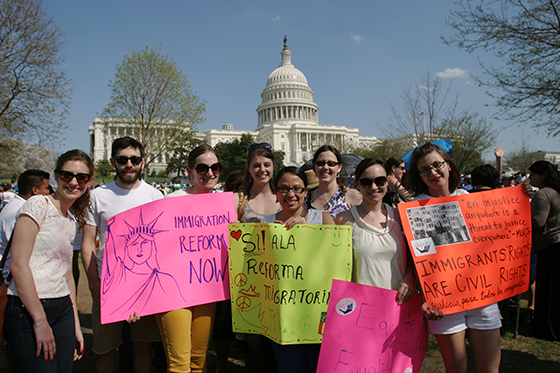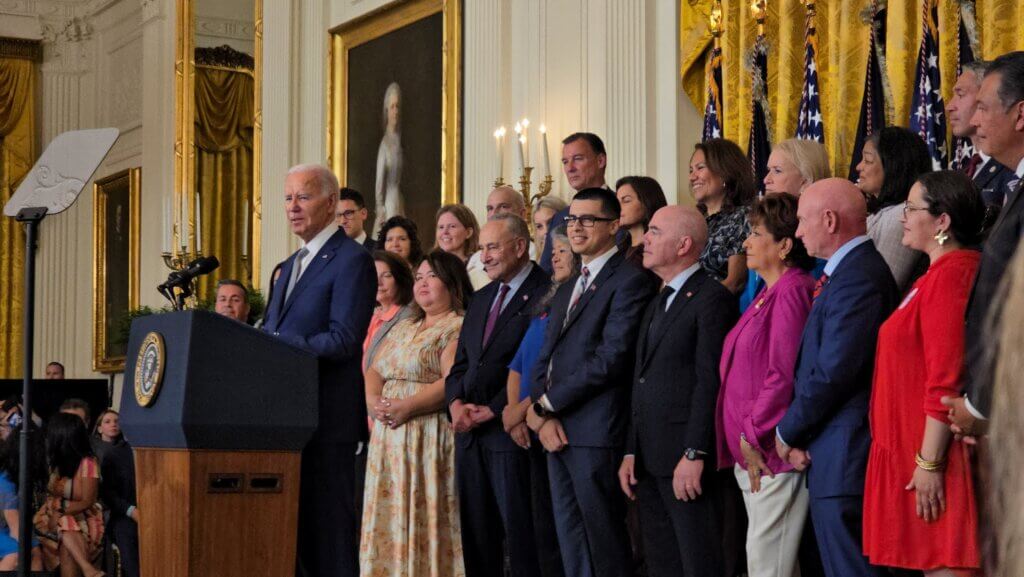This Week in Immigration Reform — Week Ending June 5
Week Ending June 5
This week in immigration: Pew Research Center study affirms support for immigration reform; NCLR continues blog series on deferred action recipients; and new research examines the implementation of DACA. NCLR kept the community informed with staff quoted in The Atlantic, Politico, Fox News Latino, Bloomberg Politics, and Univision.
New Pew research poll again shows American voters support reform: This week, Pew Research Center released a new poll on public attitudes towards immigrants and immigration reform. Consistent with prior polls on the issue, 72 percent of Americans believe undocumented immigrants who are currently in the country should be able to stay and begin a path to legal status if certain criteria are met. The research also shows that “Overall, most Americans reject the idea that giving those who came to the U.S. illegally a path to legal status is in essence “rewarding” them for bad behavior.” 42 percent of Americans believe that path should include citizenship. Among younger Americans (18-29 years of age), those supporting a path to citizenship rises to 53 percent, with 81 percent supporting a path to legal status. NCLR has long advocated for comprehensive immigration reform that includes a path to citizenship. This poll bolsters our view that immigration reform is supported by the American people and will provide great economic and social benefits.
NCLR Blog features DACA recipient Hareth Andrade: This week’s installment of our ‘Living the American DREAM’ blog series profiles a DREAMer from Virginia. Hareth came to the U.S. as a young girl from Bolivia without her parents. She excelled in high school in Arlington. She had always dreamed of attending college but soon found out that would be difficult with her undocumented status. This spurred her on to found DREAMers of Virginia to advocate for policy change. With the announcement of DACA, Hareth was able to transfer from a local community college to Trinity Washington University, where she is pursuing a degree in international affairs. When asked what she would like to see next, Hareth said, “I would like to see my parents included in DAPA [Deferred Action for Parents of Americans and Lawful Permanent Residents]. These programs shape lives. Our society can’t exclude the people who help the most. Otherwise we are not helping our country move forward.”
DACA implementation examined, lessons learned for DAPA: The Brookings Institute released a new research report examining the implementation of DACA. The findings note that, while DACA is a federal program, it requires state and local actors to implement, including vast resources from the non-profit and immigrant service sectors. Also, locales with a history of welcoming immigrants saw higher application rates among those eligible for DACA than those with a history of resisting immigrant integration. From the report: “Insights from the implementation and administration of the DACA program are useful as cities, suburbs, towns, and rural areas turn their attention toward new policies that address the legal status of unauthorized adults. We offer several ideas to strengthen the DACA process and prepare for DAPA:
- Engage the hard-to-reach population.
- Prepare for requests for documents and provide support for applicants.
- Reinforce that DACA is an ongoing program, and that renewals are important.
- Reach employers and employees with information about work authorization.
- Maintain strong communication channels between USCIS and practitioners, advocates, and applicants.
- Build on DACA to make connections to educational, language, and employment supports.
DACA and DAPA are ultimately integration programs. They remove the fear of deportation and family separation and facilitate access to jobs, helping local communities and economies. But since they are temporary and can be ended at any time, Congress must use the experience to design a program that offers permanent legal status to immigrants who are already on their way to being productive members of the communities in which they live. The experience of implementing DACA offers valuable lessons for such future initiatives.”
In other DACA-related news, the Associated Press reported an appeals court in New York granted Cesar Vargas, an undocumented immigrant who grew up in New York, attended law school and passed the New York bar, permission to practice law. Vargas came to the U.S. as a child and is eligible to work in the U.S. with DACA. In its decision, the court said it found “no legal impediment or rational basis for withholding the privilege of practicing law in the state of New York from undocumented immigrants who have been granted DACA relief.” Vargas is the first undocumented immigrant granted law license in the state of New York and the third in the country.





